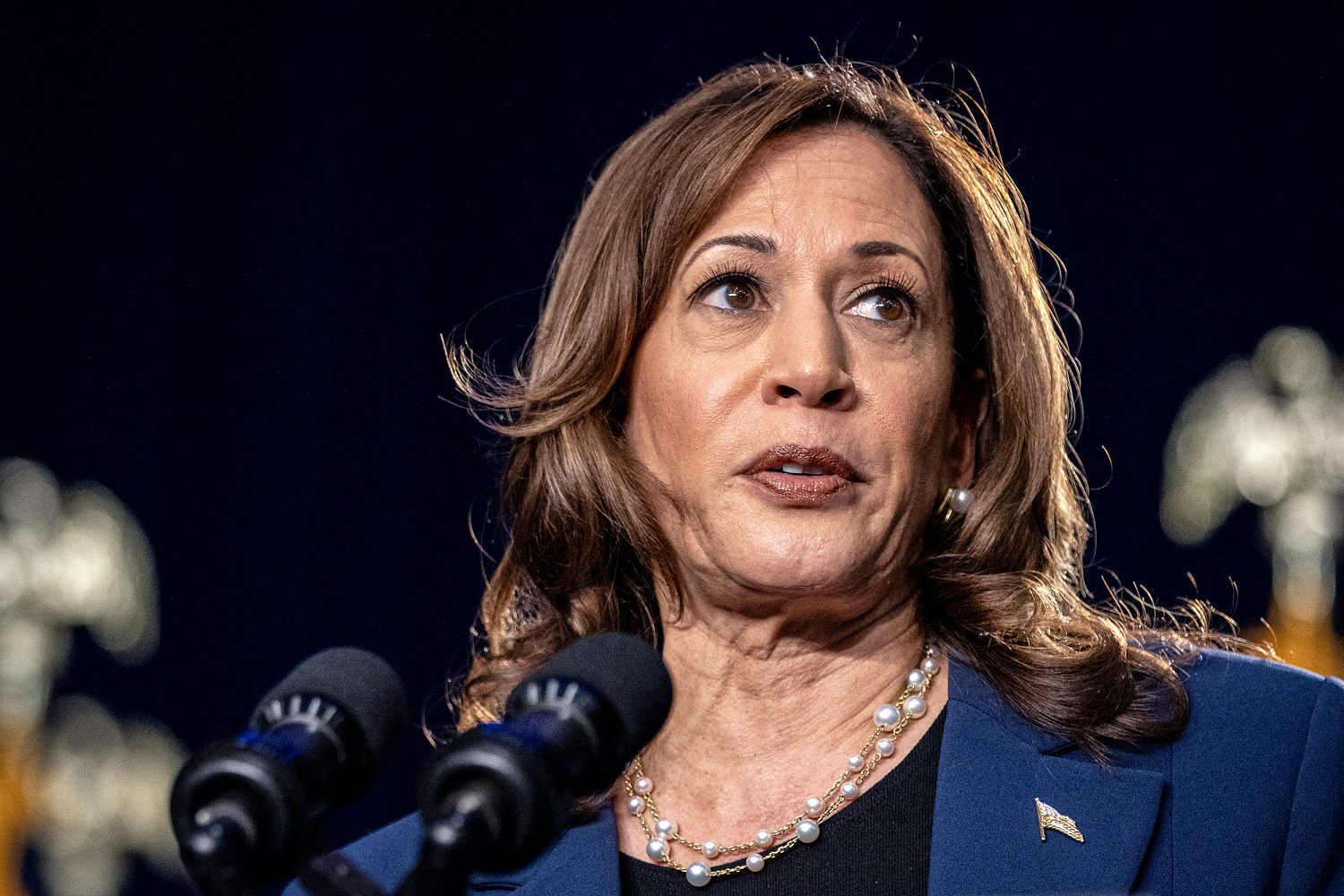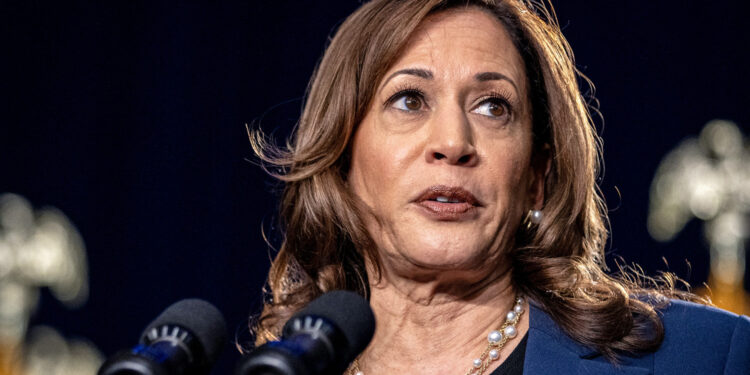
An insult uttered in schools and boardrooms about many marginalized people has a new high-profile target: Kamala Harris, the presumptive Democratic presidential nominee.
“I think she’s one of the weakest candidates I’ve ever seen in the history of our country. I mean intellectually, just really kind of the bottom of the barrel. … I think that she was a DEI hire,” Rep. Harriett Hageman, a Wyoming Republican, said of Harris.
Earlier this month, Rep. Tim Burchett, R-Tenn., said on X that the news media had “propped up” Biden, and then “dumped him for our DEI vice president.”
For Black diversity, equity and inclusion professionals, the attacks on Harris as a “DEI hire” or a “DEI candidate” show the ways racial tropes can be used against Black people in power, despite their successes. Burchett and Hageman did not respond to requests for comment from NBC News.
DEI refers to workplace policies and practices designed to support people of various backgrounds and provide resources for them to thrive, while also identifying qualified candidates for jobs to close racial and gender disparities. But it has become the latest shorthand way to allege that success and power for some people of color or from other marginalized groups are unearned.
Susan Rice, who is Black and has been ambassador to the U.N., national security adviser and most recently an adviser to President Joe Biden, said on CNN that when “a person like me or anybody else” is called a DEI hire, it means that “if you are a woman of any background, if you are a person of color, if you are an immigrant, if you are LGBTQ, if you are disabled, if you’re a religious minority, if you’re a veteran and you achieved success, rose to a position of leadership … you didn’t deserve it. You didn’t get there on merit. You got there because you got some unfair advantage. That is incredibly insulting to the vast majority of Americans who fall into all of those categories.”
While the term has been hurled at Harris before, such attacks ramped up almost immediately after Biden announced on July 21 that he was relinquishing his re-election campaign and endorsing the vice president in the November election against Trump.
The incendiary comments by some Republican lawmakers against Harris are just “another pejorative,” said Fatimah Gilliam, author of the book, “Race Rules: What Your Black Friend Won’t Tell You.”
Gilliam points to Harris’ qualifications for president: She was California’s attorney general and a U.S. senator and has been vice president for nearly a full term. “So, when people want to say she’s a ‘DEI candidate,’ it’s just a new way of trying to say she is the ‘N-word candidate,’ a way to try to break her down, chip away at her,” Gilliam said.
Harris is the highest-profile recipient of these attacks, which seem to be the result of a growing effort to undermine Black people in positions of power, say DEI professionals who spoke with NBC News. In fact, broadening the ideas of who can be powerful and successful invites such backlash, Gilliam said.
Republican nominee Donald Trump has called Harris “dumb as a rock” and repeatedly — presumably intentionally — mispronounced her first name.
Steven Cheung, Trump’s communications director, doubled down: “Kamala Harris is, by all accounts, dumb as a rock. Even minorities like myself know that. She is weak, failed, and dangerously liberal,” he told NBC News.
The insults were expected, Gilliam said. “None of this surprises me because, to be blunt, this is exactly what America is. I don’t have a Pollyanna view about where we’re headed. I have a very pessimistic view. And attacking the vice president confirms that.”
Not all conservatives are falling in line with Trump on this line of attack. Samuel Rivers Jr., a former South Carolina state representative who is Black, said he was offended by the blasts at Harris.
“I’m a hardcore Republican, and I don’t agree with Kamala Harris’ policies,” Rivers said. “But in fairness, the woman just didn’t wake up yesterday and become vice president. There’s a track record of her being elected multiple times, and so I believe people pick their VPs based on what they want them to do for them.”
Growing up in the South also informed Rivers’ position. “I saw people of African descent train a white person on the job to be their supervisor or be their manager, and no one ever said a word. We knew why that person was being promoted and not the Black person. It was because of the color of their skin. This has been going on for ages. So why are they saying she didn’t earn where she is because she’s Black?”
Other Republicans have warned that slinging this type of attack on Harris will only backfire on the Trump campaign. Republican pollster Whit Ayres told The Washington Post, for example, that Trump should instead focus on the issues and label her “a San Francisco liberal who wants to ban fracking, ban offshore drilling and eliminate private health insurance.”
But Gilliam said he believes the attacks may only intensify. And their volume and frequency against Harris and other high-ranking Black people are only becoming a more common racial trope, said Los Angeles-based DEI expert Tana Session.
“This insult using DEI is just another way of saying she’s Black and unqualified, or woman and unqualified, which has been their modus operandi,” Session said.
She pointed out that when a container ship crashed into a Baltimore bridge in March, the same language was used about Baltimore Mayor Brandon Scott, Maryland Gov. Wes Moore and the Commissioner of the Ports of Baltimore Karenthia A. Barber — all of whom are Black.
When a United Airlines plane lost a wheel during takeoff in January, Donald Trump Jr. blamed diversity efforts, and podcaster Charlie Kirk said he would feel less safe under the wing of a Black pilot. “I’m sorry, if I see a Black pilot, I’m going to be like, ‘Boy, I hope he’s qualified,’” Kirk said.
“It will get a lot worse,” Session said. “It will get a lot nastier before it gets better. And although they may be aimed at her, it’s going to be aimed at all of us.”
Loretta Muldrow, an attorney in Houston, said she endured similar insults through her career.
“This is the new way to challenge the browning of America,” she said. “They never got over an African American winning the presidency. And this term they are now using is just another way to make us something other than American. It’s just another corporate way of calling us the N-word. It’s their way of giving the undecided voters out there pause, to remind them that ‘She’s other than us,’ other than Caucasian. And as a Black woman who has been through that, it’s extremely insulting.”
It’s also telling, DEI consultant Nika White said.
“The name-calling is a sign that they are now starting to realize this is going to be a fight,” White said. “The only reason that you place emphasis on calling someone a ‘DEI hire’ is because of your recognition that she is a threat to you because of her qualifications and her competencies.”
For more from NBC BLK, sign up for our weekly newsletter.






